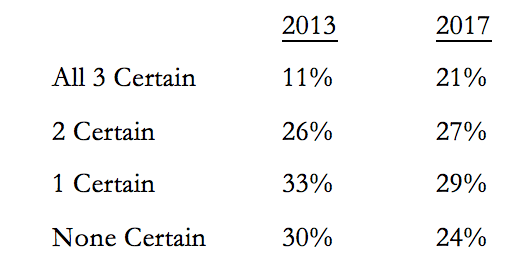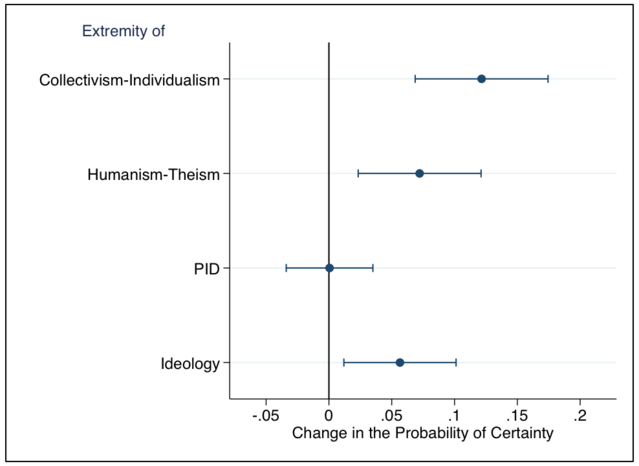“If everything isn’t black and white, I say why the hell not?”
—John Wayne
The ancient Greeks called it hubris. Contemporary Americans may call it any given Monday. Many educated people are certain that their perceptions (even those far outside their areas of expertise) are surely accurate. Everyone else must be ignorant or dishonest.
But the scientific mindset teaches us that certainty should be an oddity. Karl Popper taught that we don’t really ever know anything for sure. We simply haven’t disproved it yet—so we should update beliefs willingly when something better comes along. As they say in Starship Troopers, “You’re it until you get killed or I find someone better.” Those guys were serious, but we don’t seem to be. Many of us are loyal to our beliefs even when they become infirm and a much more competent and healthy belief is offering its services. Over-certainty in contemporary politics is common.
In a series of national surveys, we asked Americans whether a specific dueling fact—that climate change is real and caused by humans, or that sexual orientation is innate, or that racism is influential—is “certainly false,” “probably false,” “probably true,” or “certainly true.” If people took a scientific or skeptical approach, we’d expect probable responses, unless people were faced with overwhelming evidence with very little legitimate opposition. This characterizes some disputed facts, but many have strong evidence and theory on both sides. So how much certainty do Americans hold? The answer is a lot.
The Certainty of Fact Perceptions: Climate, Racism, and Sexuality

Americans have become so certain in their perceptions that those who think most of these dueling facts are certain to outnumber those who think none of them are certain. And the comparison of 2013 to 2017 suggests that certainty is rising. The percentage of Americans who see at least two out of the three DFPs as certain was 37 percent in 2013 and 48 percent in 2017 (a statistically significant difference). Clearly, John Wayne’s penchant toward certainty is as American as Westerns. Contemporary fact perceptions are more Henry V and less Hamlet, though perhaps they should be the other way around.
But where does the certainty come from? Not everyone is overly-certain and many citizens do recognize that on some things they cannot know for sure. Are certain citizens just ideologues? Partisans? Un-educated?
Under-education is not the problem. If anything, greater education leads to more certainty, not the reverse.
Neither is it partisanship, though this is the assumed culprit of choice for many political commentators. In most cases, the extremity of partisanship does not influence certainty. This includes not only climate change, but also the dueling facts regarding vaccines, crime rates, the prevalence of false convictions, the effects of minimum wage hikes on employment, the influence of immigration on the economy, or the effectiveness of gun control.
What is really driving certainty is the extremity of values.
The certain category of fact perceptions is matched by an absolute category of values. For any given value dimension, citizens can vary along a spectrum of internal value conflict, from ambivalence to absolutism. Phil Tetlock calls absolute beliefs sacred values. Sacredness is the sense in which some things are inviolable so that it is offensive to weigh them against other considerations or perhaps even to question their validity. We tend to think of religions, principles, or values as sacred things, but in our current politics, some facts may be as well.
Citizens with extreme value positions were distinctly more likely to hold certain perceptions of all of the dueling facts we studied. Partisan extremity is surprisingly weak as a predictor. The figure below provides an illustration of the connection between holding an extreme value position and reporting certain perceptions of racism. The extremity of party identity had no effect. Those with extreme ideological commitments (in either direction) were 6 percent more likely to be certain about racism. But it was citizens with extreme positions on individualism versus collectivism who were 12 percent more likely to be certain they knew the facts about race (even after accounting for all of the other influences). Absolute values are driving certain perceptions.

The origins of certainty tell us a great deal about the politics of facts. It is one of the reasons that fact perceptions are so hard to correct. Why do people resist fact-checking by journalists or correction by scientists? For one thing, their certainty is connected to their values. Discarding their facts suggests that they are insulting their values, which they will not do.
The three little words that people do not say enough may not be “I love you,” but instead “I don’t know.” We hold unwarranted certainty about facts because we love our values that reinforce them.
To end where we began, the Greeks thought hubris would be punished by their gods, who didn’t like humans over-rating themselves. Will we be punished for our lack of humility in the face of disputed facts?




